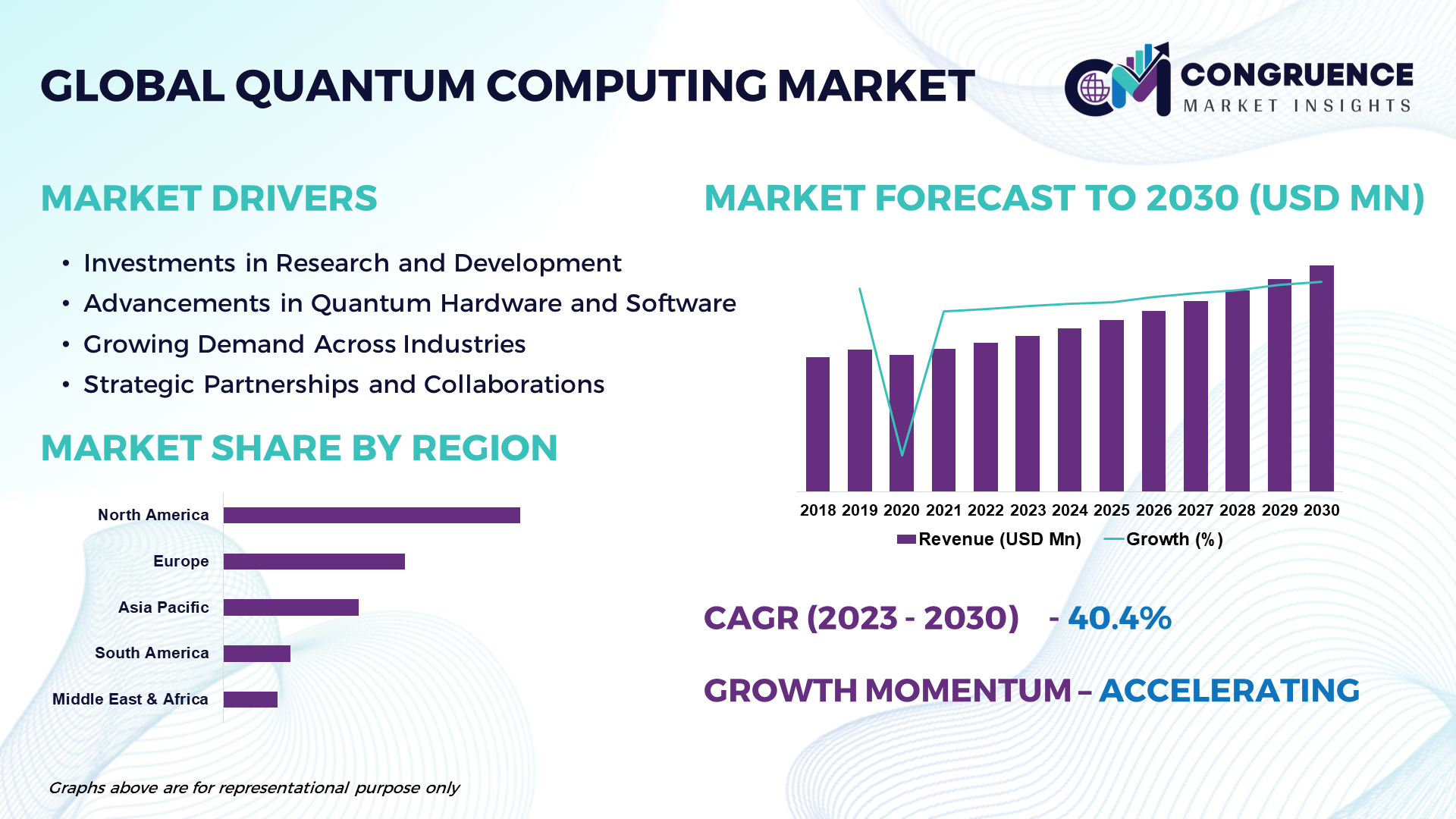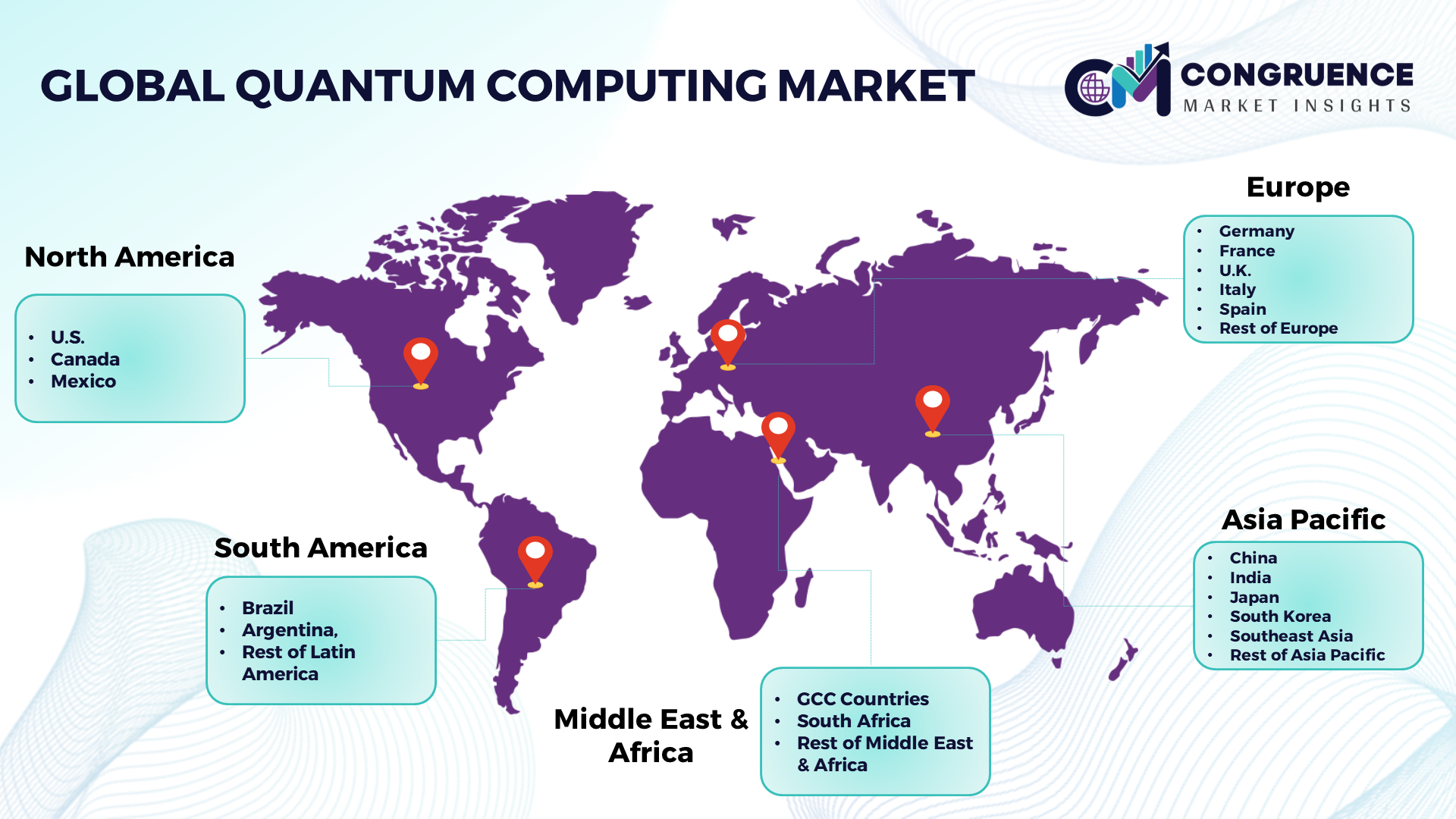Reports
The Global Quantum Computing Market is experiencing rapid growth, expanding at a remarkable CAGR of 40.4% from 2023 to 2030. Quantum computing is an emerging field that harnesses the principles of quantum mechanics to perform complex computational tasks at an unprecedented speed and scale. Unlike classical computers, which process data in binary bits, quantum computers use quantum bits or qubits, which can exist in multiple states simultaneously, enabling them to perform parallel computations and solve complex problems exponentially faster than classical computers. This growth is driven by increasing investments in quantum computing research and development, advancements in quantum hardware and software technologies, and growing demand for quantum computing solutions across various industries, including healthcare, finance, cybersecurity, and logistics. Key players in the Quantum Computing market are focusing on developing scalable and reliable quantum computing platforms, building strategic partnerships with technology companies and research institutions, and commercializing quantum computing solutions to address real-world challenges and opportunities in diverse industries.

Quantum Computing Market Major Driving Forces
Investments in Research and Development: The market is driven by significant investments in quantum computing research and development by governments, technology companies, and academic institutions worldwide, aimed at advancing quantum hardware and software technologies, overcoming technical challenges, and unlocking the full potential of quantum computing for scientific and commercial applications.
Advancements in Quantum Hardware and Software: The market is propelled by continuous advancements in quantum hardware, such as qubit scalability, coherence, and error correction, as well as quantum software, including quantum algorithms, programming languages, and simulation tools, enabling the development of more powerful and efficient quantum computing platforms and applications.
Growing Demand Across Industries: The market is fueled by the growing demand for quantum computing solutions across various industries, including healthcare, finance, cybersecurity, logistics, and materials science, driven by the need to solve complex optimization, machine learning, simulation, and data modeling problems that are beyond the capabilities of classical computers, creating opportunities for quantum computing to drive innovation and transformation in diverse sectors.
Strategic Partnerships and Collaborations: The market is influenced by strategic partnerships and collaborations between technology companies, research institutions, and end-users, aimed at co-developing and commercializing quantum computing solutions, sharing expertise and resources, and accelerating the adoption of quantum computing technologies in real-world applications and industries.
Quantum Computing Market Key Opportunities
Industry-Specific Applications: Developing industry-specific quantum computing applications and solutions tailored to the unique challenges and opportunities in key sectors, such as healthcare, finance, logistics, and materials science, has enabled organizations to gain a competitive edge, drive innovation, and solve complex problems more effectively and efficiently with quantum computing technologies.
Hybrid Quantum-Classical Computing: Opportunities are emerging in the integration of quantum computing with classical computing techniques and technologies, such as hybrid quantum-classical algorithms, quantum-inspired optimization, and quantum-enhanced machine learning, to leverage the strengths of both paradigms and address a broader range of computational problems and use cases, driving market adoption and scalability of quantum computing solutions in practical applications and workflows.
Cloud-Based Quantum Computing Services: The development and deployment of cloud-based quantum computing services and platforms, is enabling organizations to access quantum computing resources and capabilities remotely, on-demand, and at scale, without the need for upfront investment in quantum hardware and infrastructure, democratizing access to quantum computing and accelerating the development and adoption of quantum computing solutions in diverse industries and applications.
Quantum Computing Market Key Trends
· Rapid Technological Advancements: The trend towards rapid technological advancements in quantum computing hardware and software, driven by ongoing research and development efforts, continuous innovation, and collaboration across the quantum computing ecosystem, leading to the development of more powerful, reliable, and scalable quantum computing platforms and applications, driving market growth and adoption in various industries and use cases.
· Increasing Adoption of Quantum Cloud Services: The trend towards increasing adoption of cloud-based quantum computing services and platforms, offered by leading technology companies and startups, enabling organizations to access quantum computing resources and capabilities remotely, on-demand, and at scale, accelerating the development, testing, and deployment of quantum computing applications and solutions in real-world scenarios and workflows, driving market expansion and accessibility of quantum computing technologies.
· Emergence of Quantum Computing Consortia: The trend towards the formation of quantum computing consortia, alliances, and partnerships among technology companies, research institutions, and government agencies, aimed at collaborative research, development, and standardization efforts, fostering innovation, knowledge sharing, and ecosystem growth in the quantum computing industry, driving market collaboration, investment, and advancement of quantum computing technologies and applications.

Market Competition Landscape
The global Quantum Computing market is characterized by intense competition among key players and technology providers vying for market leadership and technological supremacy. Key players in the market engage in strategies aimed at product innovation, differentiation, and market expansion to gain a competitive edge. These strategies include the development of scalable and reliable quantum computing platforms, investment in quantum hardware and software technologies, strategic partnerships and collaborations with technology companies and research institutions, and commercialization of quantum computing solutions to address diverse industry needs and applications. Notable players in the market include:
· IBM Corporation
· Google LLC
· Microsoft Corporation
· Intel Corporation
· D-Wave Systems Inc.
· Rigetti Computing
· Honeywell International Inc.
· Alibaba Group Holding Limited
· Toshiba Corporation
· Quantum Circuits Inc.
These companies play a pivotal role in shaping the Quantum Computing market, driving innovation and adoption of quantum computing technologies across industries and applications.
|
Report Attribute/Metric |
Details |
|
Base Year |
2022 |
|
Forecast Period |
2023 – 2030 |
|
Historical Data |
2018 to 2022 |
|
Forecast Unit |
Value (US$ Mn) |
|
Key Report Deliverable |
Revenue Forecast, Growth Trends, Market Dynamics, Segmental Overview, Regional and Country-wise Analysis, Competition Landscape |
|
Segments Covered |
· By Offering (Hardware, Software, and Services) · By Deployment (On-Premises and Cloud-Based) · By Application (Optimization, Machine Learning, Simulation and Data Modeling, Cybersecurity, and Others) · By Technology (Quantum Annealing, Superconducting Qubits, Trapped Ion Qubits, and Others) |
|
Geographies Covered |
North America: U.S., Canada and Mexico Europe: Germany, France, U.K., Italy, Spain, and Rest of Europe Asia Pacific: China, India, Japan, South Korea, Southeast Asia, and Rest of Asia Pacific South America: Brazil, Argentina, and Rest of Latin America Middle East & Africa: GCC Countries, South Africa, and Rest of Middle East & Africa |
|
Key Players Analyzed |
IBM Corporation, Google LLC, Microsoft Corporation, Intel Corporation, D-Wave Systems Inc., Rigetti Computing, Honeywell International Inc., Alibaba Group Holding Limited, Toshiba Corporation, and Quantum Circuits Inc. |
|
Customization & Pricing |
Available on Request (10% Customization is Free) |
